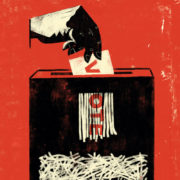— Katie Shepherd, The Washington Post
California’s secretary of state and attorney general sent a cease-and-desist letter to Republican Party leaders on Monday following reports that GOP officials were encouraging voters to drop ballots into unofficial boxes that state officials contend are illegal.
“There is nothing more precious or fundamental in a real democracy than the vote,” California Attorney General Xavier Becerra (D) said in a statement Monday. “Anyone who tampers with the vote is tampering with free and fair elections. We will do all that’s necessary under law to protect Californians’ right to vote.”
The letter gives GOP chapters a Thursday deadline to provide the secretary of state’s office with the names, addresses and birth dates of people who have already dropped ballots into the unauthorized boxes, so that election officials can contact them and verify their ballots. Those ballots must also be returned to election officials by Thursday.
— Credits
Featured Image, Gregory Bull/AP
Full article @ The Washington Post
— Related
The Chicago Defender is a Chicago-based online African-American newspaper. It was founded in 1905 by Robert S. Abbott and was once considered the “most important” newspaper of its kind. Abbott’s newspaper reported and campaigned against Jim Crow era violence and urged black people in the American South to come north in what became the Great Migration. Abbott worked out an informal distribution system with Pullman porters who surreptitiously (and sometimes against southern state laws and mores) took his paper by rail far beyond Chicago, especially to African American readers in the Southern United States. Under his nephew and chosen successor, John H. Sengstacke, the paper took on segregation, especially in the U.S. military, during World War II. Copies of the paper were passed along in communities, and it is estimated that at its most successful, each copy made its way into the hands of four to five African-Americans.
In 1919–1922, the Defender attracted the writing talents of Langston Hughes; from the 1940s through 1960s Hughes also wrote an opinion column for the paper. Washington D.C and international correspondent Ethel Payne, poet Gwendolyn Brooks, author Willard Motley, journalists Ida B. Wells and Louis Lomax wrote for the paper at different times. During the height of the civil rights movement era, it was published as The Chicago Daily Defender, a daily newspaper, beginning in 1956. It returned to a weekly paper in 2008.
In 2019, its publisher, Real Times Media Inc., announced that the Defender would cease its print edition but continue as an online publication. The editorial board of the Chicago Tribune, noting the impact The Defender has had in its 114 years, praised the continuation of the publication in its new form.
Source – The Chicago Defender (Updated: 11 September 2020) Wikipedia. Available at https://en.wikipedia.org/wiki/The_Chicago_Defender, (Accessed: 06 October 2020)

